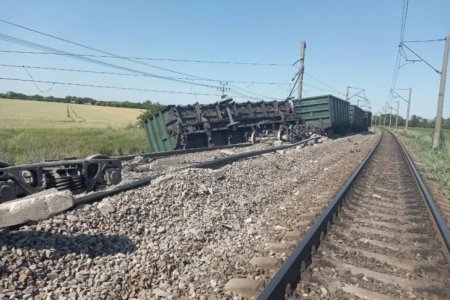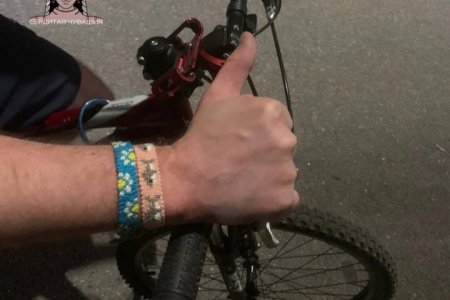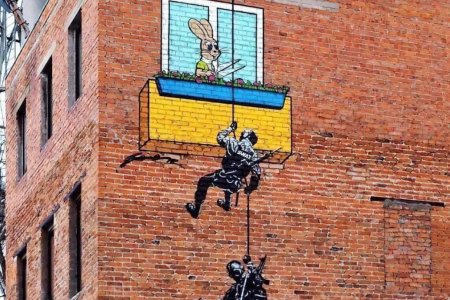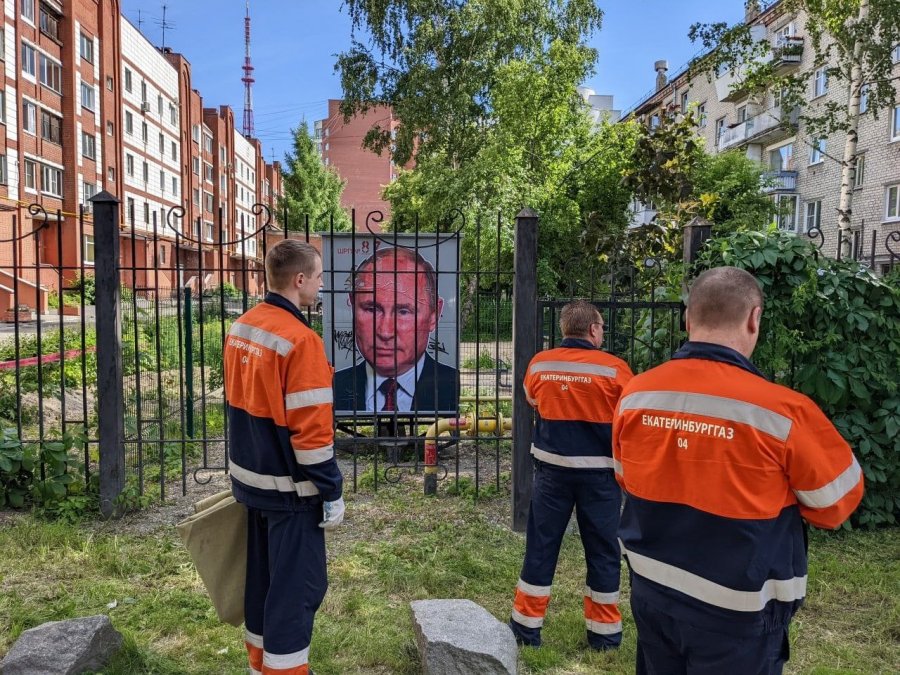
During the past week Ilya Yashin, a well-known opposition politician, was arrested in Moscow; Russia’s feminists, the “railroad partisans” and school-leavers showed their opposition to the war in a variety of ways; while Vesna activists in several cities responded to the Russian shelling of the KremenchukShopping Centre [on 27 June] with a ‘Last Purchase’ protest.
The Feminist Anti-War Resistance
During the first days of the war against Ukraine several of Russia’s famous feminists declared they were setting up the Feminist Anti-War Resistance (FAR) movement. The movement called on feminists throughout the world to engage in active opposition to the war. At home, FAR adopted various forms of protest:
- Quiet Protests–decorating their clothes with Ukrainian and anti-war symbols; artistic anti-war demonstrations.
- Woven anti-war bands and bracelets.
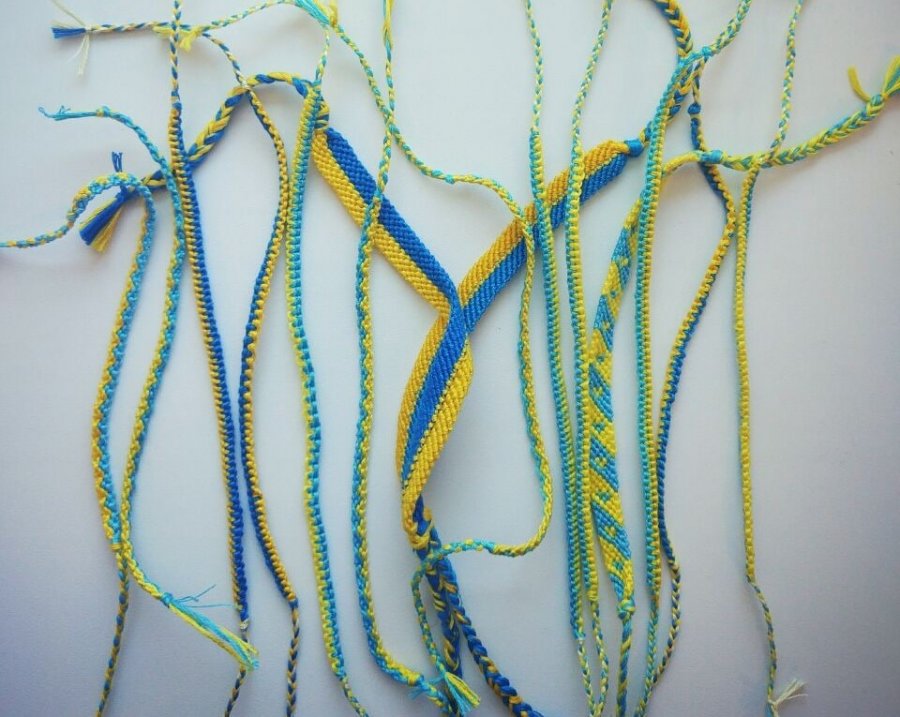
- FAR has regularly attempted to breach the information blockade in Russia, which prevents news about the war reaching the country’s millions of inhabitants. As part of their Mariupol 5,000 Protest, they erected graves in the courtyards of ordinary apartment blocks, trying to draw people’s attention to the killing of civilians in Mariupol.
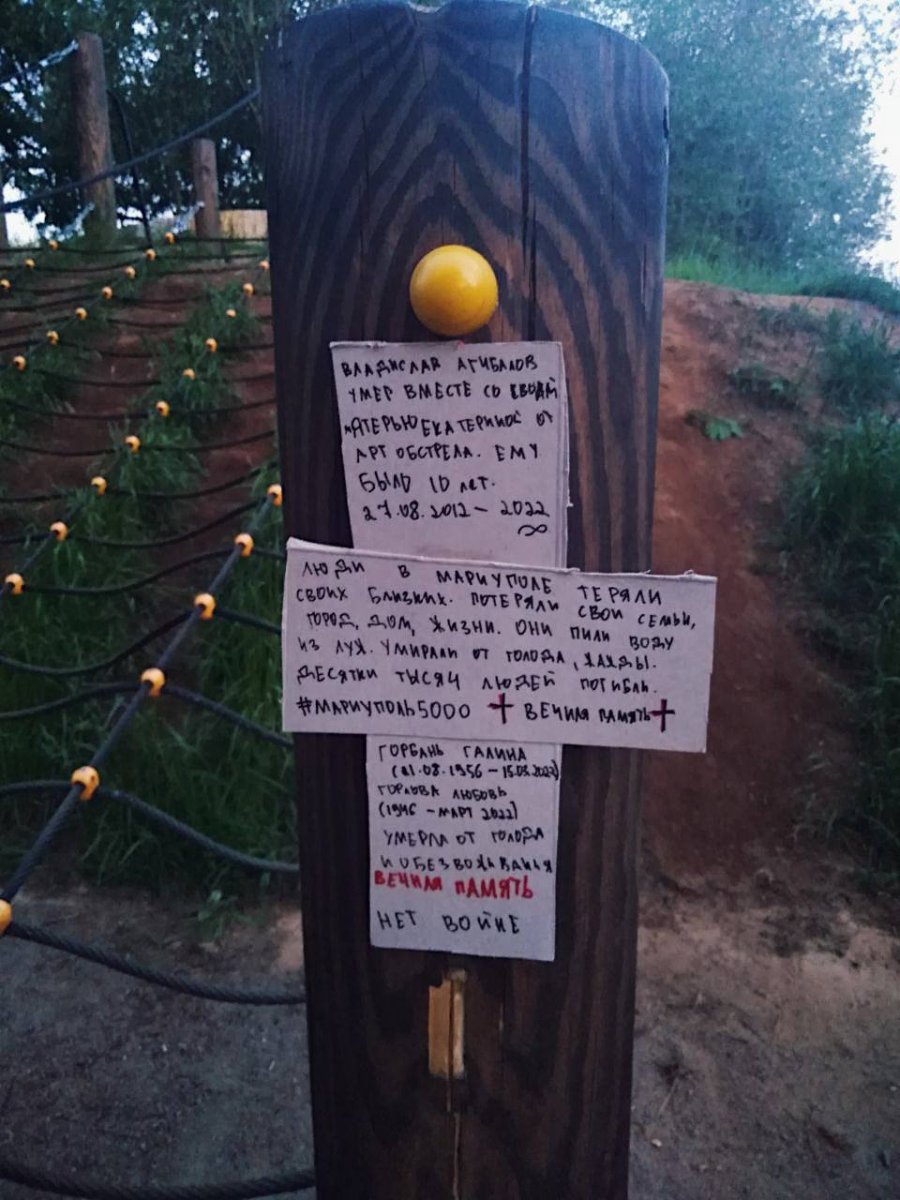
- “Women in Black”. In a number of Russian towns and cities FAR supporters dressed in black went out into the street and began to weep loudly. Passers-by asked them what had happened. In reply they heard about the atrocities committed by Russian soldiers in Ukraine.
Deeds not Words: the “Railroad Partisans”
14 freight wagons were derailed on the Sgibeyevo-Bolshaya Omutnaya stretch of the Trans-Siberian Railroad.
As a result, the parallel rail tracks and the overhead wiring were also damaged, and movement was halted for a while on a key transport route across Russia. The “Stop the Trains!” initiative said the accident was the work of the underground railroad resistance.
The new website The Insider reported
“330 Trans-Sib employees and numerous pieces of equipment were brought in from the Yerofei Pavlovich, Skovorodino and Mogocha rail stations to repair the damage.
“Local and inter-city passenger trains were disrupted …: trains between Moscow and Vladivostok were delayed; suburban trains running between the Yerofei Pavlovich and Skovorodino stations were cancelled; and a train running westwardsgot no further than the Urusha station in the Far East (Amur Region). While repairs were under way, passengers on trains from Moscow were given extra food supplies.
“This is the second accident involving freight trains on the Trans-Sib Railroad. On 11 June, 24 freight waggons were derailed on the Krasnoyarsk section of the railway. The Trans-Siberian Railroad is considered to be the largest rail artery in the world. It is actively used for transporting various goods between Russia and China, and it links European Russia with the ports of the Far East. After sanctions were imposed on maritime shipments the railways became one of the main routes for transporting commodities. The capacity of the Far Eastern transport polygon, however, is insufficient to facilitate a prompt ‘eastward shift’ and this has been acknowledged by the Russian government itself.”
(See also “This train’s on fire”, The Insider [E], 6 July 2022.)
*
A post on the “Stop the Trains!” Telegram channel read
“Naturally, we’re not stupid. We know the interruption is temporary. At the same time, it’s highly symbolic because it demonstrates the strength of the railroad resistance.
“There are more and more of us, because we know what we’re doing and, most important of all, we know whom we’re fighting against.
*
In Nizhny Novgorod (Volga Federal District) an unidentified man tried to set fire to the checkpoint at the main entrance to the local FSB department.
The event took place during the daytime on 30 June. A man approached the FSB building on Malaya Pokrovskaya Street and threw a bottle, presumably containing an inflammable mixture, in the direction of the checkpoint. It did not catch fire and the man ran away. He is now being sought.
Russian Citizens Persecuted for Anti-War Protests
In St Petersburg, custody of activist Boris Romanov was extended until 5 August, reported the “Freedom for Sasha Sochilenko” Telegram channel. He is accused of circulating “fake news” about the Russian army.(The channel was set up to support Petersburg artist Alexandra Sochilenko, but it also reports on many other people arrested for their anti-war protests.)
At the court hearing to extend Romanov’s term of custody his mother, his friend, and Sergei Troshin, municipal deputy for the Liteiny district, offered positive accounts of Romanov’s personality and character. The judge ignored their statements.
*
One of the most striking events of the past week was the arrest of Ilya Yashin, –https://t.me/yashin_russia/446–a well-known opposition politician and municipal deputy in Moscow. 1.3 million subscribers follow the daily comments he posts on his YouTube channel.

39-year-old Yashin has openly condemned the war against Ukraine. He is popular in Moscow and, friends say, people always come up and shake his hand on the street, take selfies with him, and express their support and respect for his statements and activities.
He was arrested in in the city’s Khamovniki Park late on 28 June, when he was out for a stroll with journalist Irina Babloyan. Yashin was charged with disobeying a police officer:
“The complaint against me was compiled by police sniper (!) Alexei Mitrofankin. He claimed that I grabbed his uniform, insulted him and pushed him away. As I read the charge sheet, I was amazed what a psycho they made me out to be.
“In fact, I was sitting on a bench with my girl-friend Ira Babloyan when three policemen ran up and, without saying a word, took me away in a vehicle with the letter Z on the windscreen.”
On 29 June, the court sentenced Yashin to 15 days detention.
“Why did they arrest me? Evidently, the reason was political.
“I’m an opposition politician, an independent deputy, a critic of President Putin and an opponent of the war against Ukraine. The arrest was a way of putting pressure on me.
“Probably, it can be linked with the election campaign which opened yesterday in Moscow [municipal elections are scheduled for 11 September this year]. They are trying to isolate me and obstruct my campaign for re-election. During the last few days independent deputies have been arrested all over the city.
“My arrest could lead to criminal charges. My colleague Vladimir Kara-Murza was arrested earlier in just the same way. He was transferred straight from the holding cell to the Interrogation & Detention Centre (SIZO), and now faces criminal charges for speaking out against the war.
“My arrest is the latest hint from the authorities, who have repeatedly invited me to emigrate.
“In this respect I would like to make the following official announcement:
-
The case against me is fabricated – I am innocent;
-
The war against Ukraine must end without delay;
-
Putin must go;
-
Russia must be free!
“Yours faithfully, Ilya Yashin.
“Moscow, 28 June 2022”
*
On 28 June, lawyer Dmitry Talantov, the president of Udmurtia’s Bar Association, was also arrested.
The Volga District lawyer was charged with spreading “fake news” about the Russian army (Article 207.3, pt. 2, item [e]) and could face 5-10 years imprisonment. Talantov is defence attorney of journalist Ivan Safronov, who is currently being tried for treason.
The pretext for Talantov’s criminal prosecution, wrote the OVD-Info monitors,
“was a post on Facebook,where he called the behaviourof the Russian army in Mariupol, Irpen and Buchathe actions of Nazis.
“Talantov ‘knew the popularity of Facebook’, the investigators said: his opinion as president of Udmurtia’s Bar Association carried weight and could influence his fellow lawyers and other people besides.”
*
In the Urals, in the town of Revda (Sverdlovsk Region) a man was accused of discrediting the Russian army because of banknotes bearing anti-war slogans that were found in an ATM. He faced a fine of between 30,000 and 50,000 roubles.
The statement that led to his arrest was written by a Savings Bank (Sberbank) employee who found the banknotes in the ATM. The accused informed the Evening News channel that police detectives called him in for questioning after receiving the denunciation from the Sberbank employee: together the detectives and Sberbank staff identified who among their clients they suspected of spreading such anti-war statements.
*
A court again extended custody for artist Sasha Sochilenko, who facesprosecution (Article 207.3, RF Criminal Code)for circulating “fake news” about the Russian army. She remained in the SIZO. The artist has a large support group; Petersburg deputy Boris Vishnevsky has spoken on her behalf in court and offered to stand guarantor for her if she were released, pending trial.
*
RusNews Journalist Maria Ponomarenko, arrested for ‘fake news’ about the army, was transferred, reported Novaya gazeta-Europe, “from the SIZO to a psychiatric hospital.”
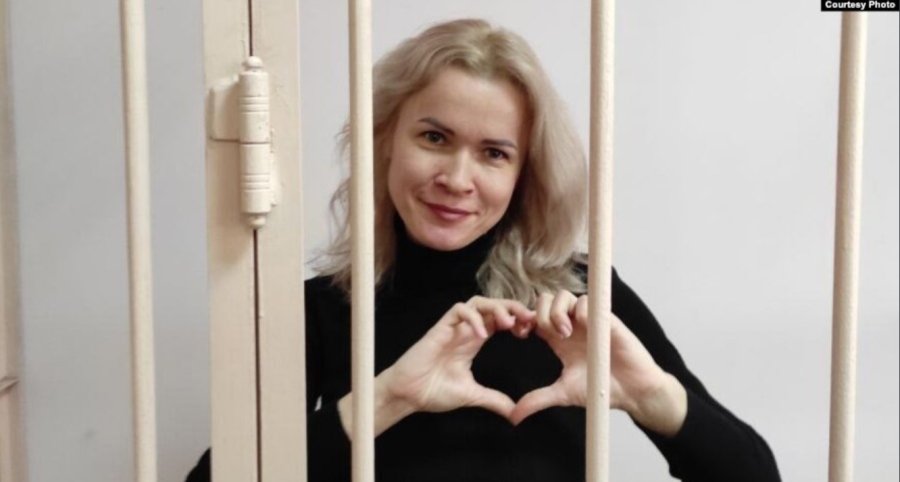
Ponomarenko lives and works in the city of Barnaul (Altai Krai) and is the mother of two young children [E]. Her lawyer Sergei Podolsky said she was sent for an in-patient psychiatric assessment to a clinical psychiatric hospitalin southern Siberia and would spend about a month there.
At the end of April 2022, a court in St Petersburg sent Ponomarenko to the SIZO for two months after she was charged with spreading “fake news” about the actions of Russia’s armed forces (Article 207.3, pt. 2, RF Criminal Code). The measure of restraint was then prolonged for another two months until 28 August.
Anti-War Initiatives by Students and Schoolchildren
School students arrived for their graduation ceremony wearing green sashesmarked with the peace symbol and dressed in black as a sign of mourning for those dying in Ukraine.
One pupil, a subscriber to the “Feminist Anti-War Resistance” Telegram channel, described what happened:
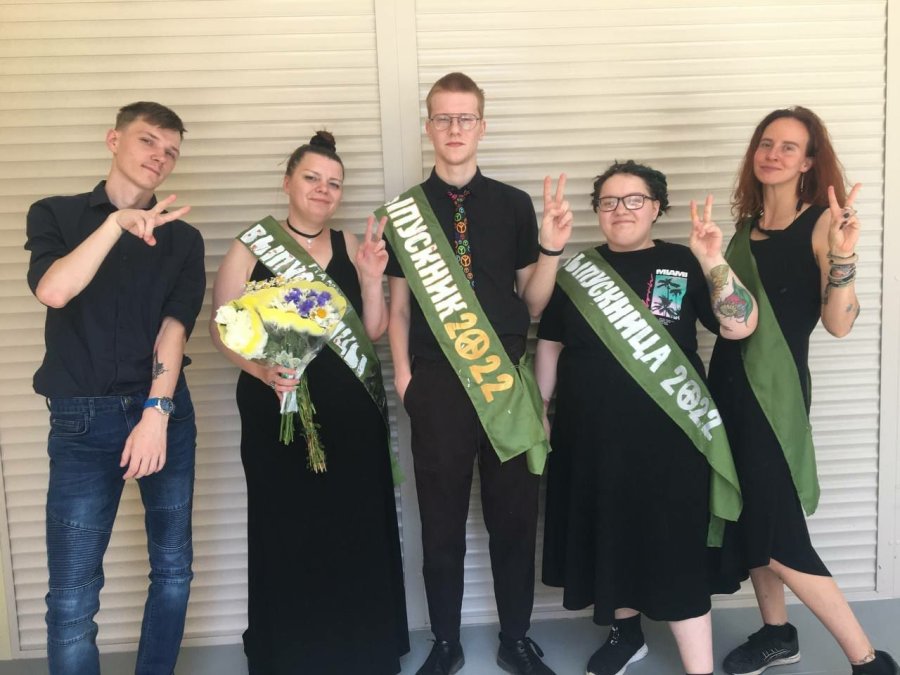
“People on the street asked why we were dressed in black. We said we are in mourning because people are dying in Ukraine. Some thanked us for our stand and said they were proud of us. Throughout the ceremony the organisers tried to hide us, but we showed we were there: either we pushed our way to the front or held up our arms and gave the peace sign.”
*
During the leaving ceremony at a college in St Petersburg a student raised a placard reading, “No to the war” as she and her fellow pupils were being congratulated on completing their studies. Singer Yury Shevchuk spoke of her protest in “They are smashing our principles” (see below). It’s not known what happened after her protest.
*
Graduates of the Burdenko University in Voronezh (Central Russia) refused to donate towards a quadcopter for the Donetsk “People’s Republic” (DPR) despite the demands of the administration. As a punishment they were not allowed to bring their parents to the graduation ceremony.
Art against the War
An installation appeared in Victor Tsoi Square in St Petersburg devoted to the anti-war songs and activities of the Beatles.
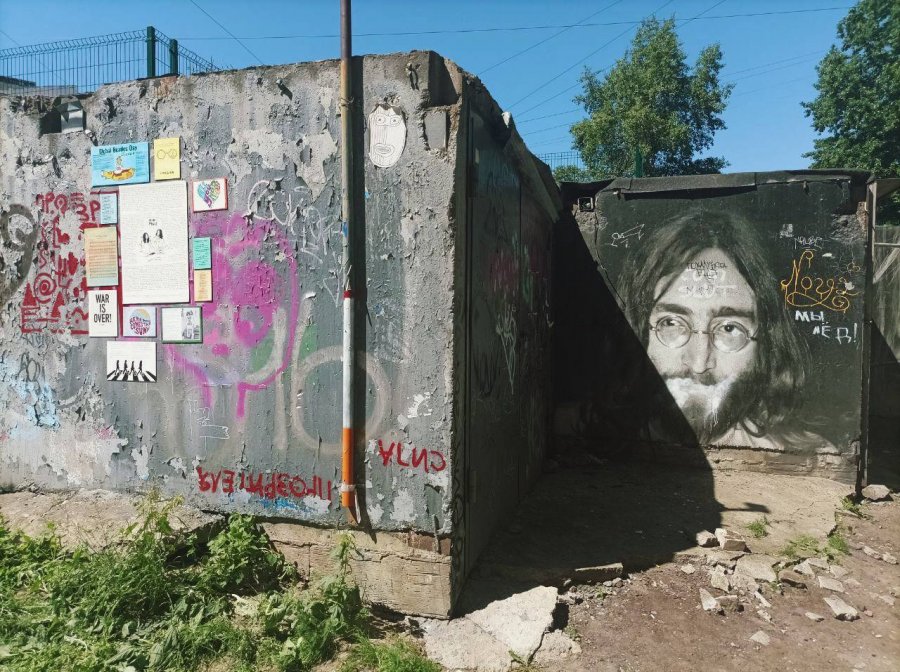
*
Musicians of the St Petersburg governor’s orchestra tore down a Z poster above their work schedule. The orchestra inspector Gai Davtyan demanded that they submit their resignation.
*
“They are turning us into cannon-fodder and sub-humans,” said Yury Shevchuk, leader of the DDT rock group, in an interview with the Voice of America radio station. “They’re ripping out our souls, smashing our principles and destroying our spirit and personality as they did in the camps. And that, it strikes me, is even more frightening than when bullets are whistling about our ears.” His words were recorded in The Village.
*
In the centre of the Urals largest city Yekaterinburg, a portrait of Putin was pasted on a gas panel behind metal railings. Soon the image of the president behind bars was concealed by a large cloth.
*
“Zed is Dead” bot. The @zedisdeadbot was launched on the “Media Resistance” Telegram channel. Its organisers suggest that people use it to post photos of vehicles carrying the symbolic letter Z. The bot recognises vehicle registration numbers, automatically sorts the vehicles by region and adds them to a unified database. What is to be done with this information, the organisers proposed, should be left up to “history to judge”.
A Response to the Kremenchuk Shopping Centre Atrocity
“Last purchase” protests (#PoslednyayaPokupka) were made in several of Russia’s major cities–Moscow, St Petersburg, Krasnodar and Yekaterinburg–in response to the shelling the previous week of the Kremenchuk shopping centrein Ukraine’s Poltava Region. Vesna activists left bloody, or partly burned paper and plastic bags in public places, containing information about the deaths of civilians at the Kremenchuk shopping mall after it was shelled by the Russian army.
On their Telegram channel, the activists wrote:
“The Russian Ministry of Defence has confirmed that it hit a target in Kremenchuk. The number who died, as a result, has risen to 18 and in total 59 civilians were killed or wounded. A further 36 people are listed as missing.
“Join the demonstration! Visual protests are one of the few ways we can tell Russian citizens what Putin’s ‘special operation’ really looks like.”
Certain Vesna activists and subscribers to the movement’s online resources are already being harassed by the Russian authorities.
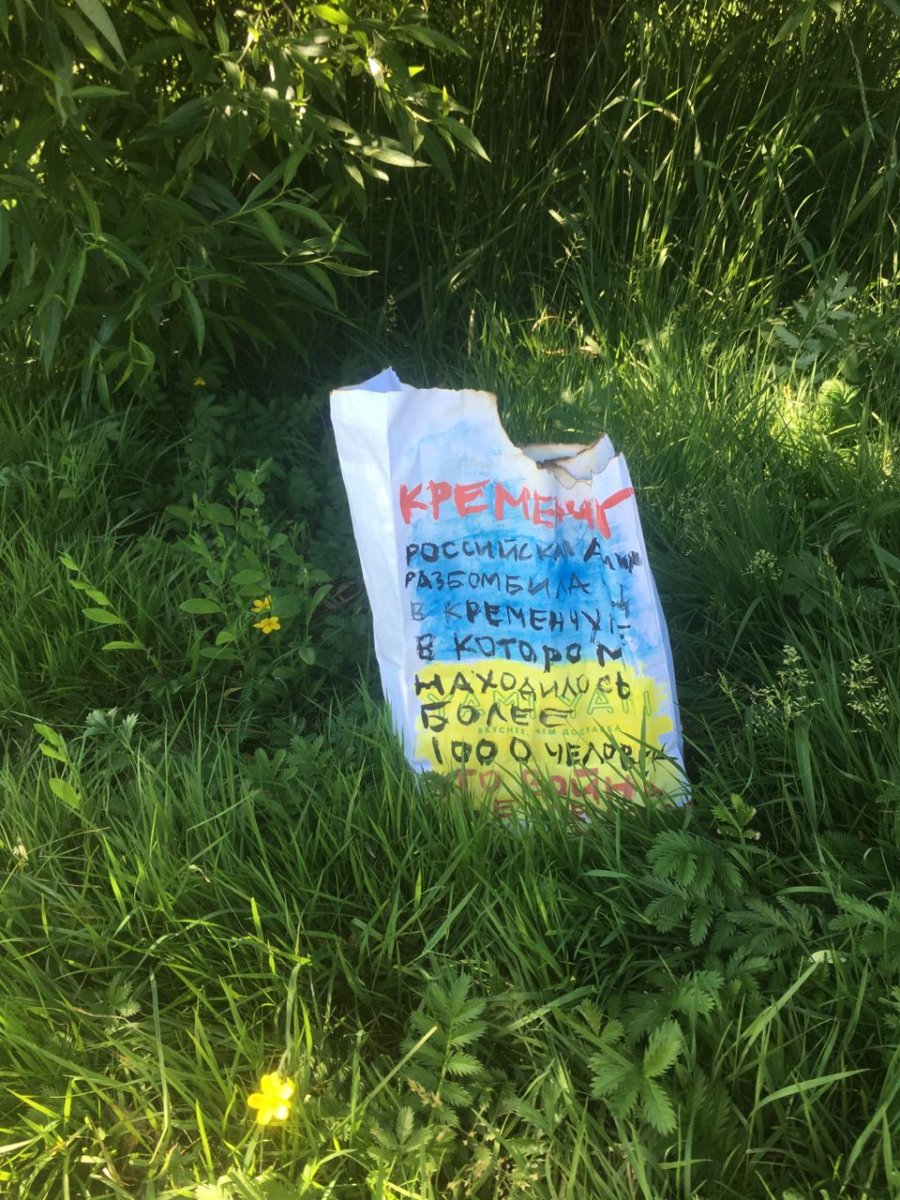
Laws Made Yet Tougher in Russia
The Russian regime is still seeking ways to boost recruitment to the Russian army without declaring universal mobilisation. In May the authorities abolished the upper age-limit for contract soldiers. A new draft law has now appeared that would allow school-leavers to sign up as contract soldiers.
Rights activists speaking in the media said teenagers should not be sent off to a battle zone. Discussion of the bill was delayed [but the law was later adopted, HC].
*
The Russian government brought a draft law before the State Duma concerning “changes in particular RF laws about supplying and equipping the armed forces, other troops, military formations and bodies involved in anti-terrorist and other operations outside the borders of the Russian Federation”.
Unless marked [E], sources quoted in this digest are in Russian.
Тhis digest was prepared by Memorial volunteers from the following sources: OVD-Info and The Insider websites; and the Telegram channels of the “Feminist Anti-War Resistance”, the “Media Resistance Group”, The “Vesna” Movement, “Activatica”, and “Sota”.
Translation, John Crowfoot
